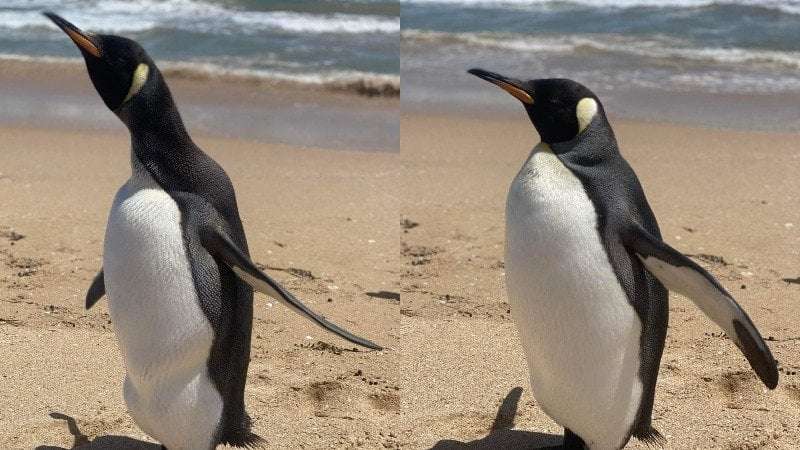A group of birdwatchers has been left amazed by a surprise sighting of a king penguin on a beach in the Coorong area of South Australia.
Key points: A king penguin has approached birdwatchers on a beach in south-east South Australia
A king penguin has approached birdwatchers on a beach in south-east South Australia The birds normally live in Antarctica and on sub-Antarctic islands
The birds normally live in Antarctica and on sub-Antarctic islands An Antarctic research scientist says the penguin's arrival, while exciting, may be cause for concern
King penguins normally only live in Antarctica and on sub-Antarctic islands.
But a group from Friends of Shorebirds South East saw one north of Kingston South East last week.
President Jeff Campbell said the group was doing a survey of bird numbers when the penguin came up to its vehicle.
"We were up high on the beach. We stopped and it kept on walking up towards us," he said.
"Then it did some displays towards us and then did its really strange braying calls, putting its head back and then bowing to us and then it came really, really close to us.
"We didn't go towards it, it came towards us."
Mr Campbell said the penguin may have come onto the beach to moult.
"I wouldn't be surprised if this bird has never seen a human before," he said.
"It was a young bird. It's come from a sub-Antarctic island like Heard Island or Macquarie Island and has landed here, so [it's] probably never encountered a human before and didn't know humans could be dangerous."
Steve Jenkins took videos and photos of the penguin.
"It walked down the beach to me while l was fishing and stayed a couple of hours until l left," he said.
The young king penguin was happy to approach humans. ( Supplied: Steve Jenkins )
Australian Antarctic Division senior research scientist Dr Barbara Wienecke said king penguins were the second-largest penguin species in the world.
She said it was rare for them to end up on the mainland and hard to determine why they sometimes made the journey.
"The bird ... seems to be in incredibly good condition, so I suspect that he or she is probably going to start moulting," she said.
"[That] is in some ways not such a good thing because obviously that little bird's picked a spot that's far warmer than what it would normally encounter."
BirdLife South East SA's Bob Green was part of a group that kept watch when a king penguin turned up at Port MacDonnell in 2004 — the second time the species was seen in South Australia.
"Nearly 300 people turned up to see it on one day, so I was tasked with keeping an eye on it," he said.
"Because they do come so rarely in spots where people can go, they attract a fair bit of attention when they do get here."
A king penguin was also spotted in 1987 in the nearby Canunda National Park.
Dr Wienecke said she had "mixed emotions" about mainland sightings.
"It's always exciting to see them because they are such beautiful and stunning birds," she said.
"But it's also concerning when they are in an environment when they potentially interact with creatures they've never seen before — not so much thinking about people, but particularly dogs.
"There is always the risk they could encounter a situation they cannot handle."
The only penguins that usually live in South Australia are little or fairy penguins.
All known little penguin colonies are on offshore islands.
SA's National Parks and Wildlife Service was not concerned about the bird's welfare.
